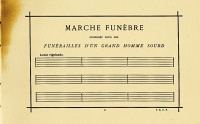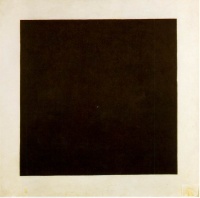Void
From The Art and Popular Culture Encyclopedia
(Difference between revisions)
| Revision as of 11:49, 3 May 2014 Jahsonic (Talk | contribs) ← Previous diff |
Revision as of 11:51, 3 May 2014 Jahsonic (Talk | contribs) Next diff → |
||
| Line 12: | Line 12: | ||
| *[[Nothing]], is the absence of everything or a void. | *[[Nothing]], is the absence of everything or a void. | ||
| ==Namesakes== | ==Namesakes== | ||
| - | *[[Sir Nose Devoid of Funk]] | + | *[[Sir Nose Devoid of Funk]], character of P-Funk mythology |
| *[[A Void (novel)|''A Void'' (novel)]], translation into English of ''La Disparition'' | *[[A Void (novel)|''A Void'' (novel)]], translation into English of ''La Disparition'' | ||
| ==Etymology== | ==Etymology== | ||
Revision as of 11:51, 3 May 2014

Funeral March for the Obsequies of a Deaf Man (1884), a composition by Alphonse Allais. It consists of nine blank measures and predates comparable works by John Cage ("4′33″") by a considerable margin.
|
Related e |
|
Featured: |
Void is an adjective used to denote containing nothing; empty; vacant; not occupied; not filled;
Void may also refer to:
- Lack of matter, or vacuum
- Void, or Shunyata, Buddhist philosophical concept
- Nothing, is the absence of everything or a void.
Namesakes
- Sir Nose Devoid of Funk, character of P-Funk mythology
- A Void (novel), translation into English of La Disparition
Etymology
From Old French vuit, voide (modern vide).
See also
- 0 (number)
- Abyss
- Bottomless pit
- Empty space
- Nihilism
- The Void (philosophy)
- Saut dans le vide by by Yves Klein
- In modern sculpture, void is a sculptural concept
- Treatise on the Void by Blaise Pascal
- Zero
Unless indicated otherwise, the text in this article is either based on Wikipedia article "Void" or another language Wikipedia page thereof used under the terms of the GNU Free Documentation License; or on research by Jahsonic and friends. See Art and Popular Culture's copyright notice.


